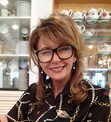Vicki Wilkerson's Blog
February 9, 2022
MY YEAR WITHOUT FACEBOOK
When Facebook first started, I was excited to sign up and use the social media platform. I was able to touch base with friends I hadn’t seen in a very long time. It was new and fun. I remember one of my posts at the beginning was something about Facebook reminding me of kindergarten. People were kind to one another, clicking smiley faces on cute posts and giving a thumbs-up to everyone’s comments.
Facebook, over the years, however, turned into something very different from its beginnings. It became a place where bullies would say the most horrendous things to people they called “friends” and to people they didn’t even know. I was abhorred and mortified to see such behavior. People had started using it to ghost others and stalk acquaintances. Facebook had become a battleground for intolerance and divisiveness.
And that is one of the many reasons why I furtively left Facebook for over a year. And you know what? I didn’t miss the medium One. Little. Bit. I did, however, miss some of my good friends and their positive, uplifting and inspiring posts.
During the past year, I have had to care for some of the most special people in my life in a way that they had never needed before…and I was honored to do that…and I still am. In the little time I had left over, I learned some very valuable things during my year without Facebook.
I learned that a sense of peace had settled over me during my year of absence from the social media giant. Life was calmer, more serene. I was present—truly present—in everything I did. No more taking the time to write blurbs and post photos of my making wine, baking bread, having dinner with my precious husband, and camping with great friends. I did all those things, and I took some photos for my personal scrapbook, but I lost the desire to promote and gained the extra time it took to do it...and peace of mind in not having to monitor my account to respond to the people who took their precious time to make comments. And you know what? Most people didn’t even care that I didn’t post (we take our curated online selves too seriously sometimes)!
After a while, I began to think of my dear friend, Henry David Thoreau, who said in Walden, “I wanted to live deep and suck out all the marrow of life.” If life were the marrow, I discovered, Facebook was the fat. That “fat” had been, at times, unpalatable and always unnecessary, it seems.
My absence was a year that I grew closer to my husband and family. I stayed in touch with many friends though phone calls, visits, texts, lunches and camping trips. I somehow managed to still find out about important events in the lives of friends and extended family—just like before Facebook ever became Zuckerberg’s entrepreneurial, maniacal, money-making monstrosity that it has become in so many people’s lives. I didn’t miss Mark and his greedy friends spying on my purchases and searches, only to shamelessly promote their advertising sponsors and cagy agendas. I got my information and news from independent sources, just like in the old days.
 Last summer we spent time on the Oregon coast.I lost no friends, no followers, no business, no money, no time, and no sleep. I still edited for other authors. I still wrote, and I lived a very full life, traveling, cooking, quilting, painting, crafting and sewing (and, yes, a tree does make a sound in the woods when it falls and no one is there to hear it, and people do live full, happy lives, even if they are not documented on social media). In short, I lost nothing without Facebook in my life. Facebook became…irrelevant. During that year, I was never ignored, hurt, insulted, gaslighted or excluded. I wasn’t a part of any drama. Harmony and tranquility had been restored in my life.
Last summer we spent time on the Oregon coast.I lost no friends, no followers, no business, no money, no time, and no sleep. I still edited for other authors. I still wrote, and I lived a very full life, traveling, cooking, quilting, painting, crafting and sewing (and, yes, a tree does make a sound in the woods when it falls and no one is there to hear it, and people do live full, happy lives, even if they are not documented on social media). In short, I lost nothing without Facebook in my life. Facebook became…irrelevant. During that year, I was never ignored, hurt, insulted, gaslighted or excluded. I wasn’t a part of any drama. Harmony and tranquility had been restored in my life. As in so many cases, however, all good things must come to an end, and my time away from the social media behemoth has, as well. Authors—it seems—need social media (to some degree) in today’s world. I have settled back in to editing a couple of novels that I had finished last year, so I suppose I need to inform my readers about releases and such. This time around, though, I will manage Facebook with boundaries (my new best friend) and on a calculated, scaled-back basis. I will operate with the knowledge that too much of a good thing is surely to become a bad thing, so I will release the unnecessary and will keep all the positive portions of what I have learned during My Year without Facebook.
So, who cares about My Year without Facebook? Perhaps, nobody will, or perhaps what I’ve learned may be beneficial to someone. If it is something that intrigues you, you might consider altering your presence on Facebook, as well. Either way, I wish you well…and peace.
December 3, 2020
Relationships Are Bridges
 Relationships are bridges. They are two-way passages that make easy the travel over difficult terrain. They are necessary, essential, and in nearly every case, they are the central device that connects people.
Relationships are bridges. They are two-way passages that make easy the travel over difficult terrain. They are necessary, essential, and in nearly every case, they are the central device that connects people. I love metaphors because they address multiple learning modalities. They not only target auditory learners, but they also create mental pictures in people’s minds, thereby, targeting visual learners, as well. Therefore, the metaphorical information will more likely be remembered and valued.

So, to demonstrate my metaphor that relationships are bridges, allow me to elaborate. Relationship bridges are not like large public bridges, supported by state and federal taxpayer funds. Instead, they are privately-owned, small bridges, supported and maintained by two people—the two people in the relationship.
Imagine if only one of the two people is tending the bridge, caring for it, maintaining it, painting it, replacing boards and rails, travelling over the bridge, making it relevant, and the other person completely neglects the bridge, never making an attempt to cross it, to spend time on it, maintaining it—essentially not valuing it and ignoring it until the bridge lover makes another attempt at keeping the little bridge that connects the relationship viable. And in some cases, the bridge snubber, even subversively sabotages the delicate bridge, defaming it, throwing little cherry bombs at the bridge or even setting small fires because she has no investment in the little bridge. Eventually, the bridge will be used less and less because the bridge lover will grow tired and weary, unable to convince herself that any of her hard work is appreciated.
 After years of neglect by the inattentive bridge co-owner who doesn’t care, the bridge lover will visit that small, private bridge less and less until the thing that she’d once loved begins to crumble. Eventually, she will realize she is helpless to affect change and to engender love from the person who has disregarded the bridge for years, so, she, too, abandons the bridge that had once been precious to her, and the bridge falls.
After years of neglect by the inattentive bridge co-owner who doesn’t care, the bridge lover will visit that small, private bridge less and less until the thing that she’d once loved begins to crumble. Eventually, she will realize she is helpless to affect change and to engender love from the person who has disregarded the bridge for years, so, she, too, abandons the bridge that had once been precious to her, and the bridge falls. So, my friend, I encourage you to tend your bridges. They are too precious to lose and too expensive and difficult to rebuild.
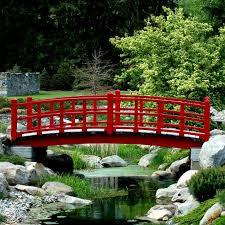
July 16, 2020
Symbolism Is in the Eye of the Beholder
Just like beauty is in the eye of the beholder, so follows symbolism. Symbolism adds depth and meaning to works of literature. It causes people to engage in the process of reading, to infer, to contemplate.
I work hard to build symbolism into each novel I write and into each poem I pen.
For years, as a high school English teacher, I taught students how to access symbolism as a literary device to unlock the deeper meanings of literature. The definition of symbolism is “something that stands for something else.” I always began my lesson by pointing to the American flag hanging in my classroom. I would ask, “What does that flag symbolize to you?”
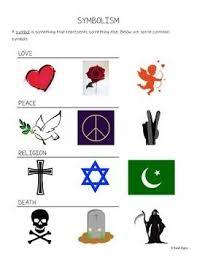 Most students would offer the following words: the fifty states; freedom; America; life liberty and the pursuit of happiness; patriotism; liberty; independence; opportunity, etc. You get the picture. I would then tell them that if this flag were placed in another country, and I asked the same question, I would hear very different responses. Some may say the American flag might symbolize tyranny, injustice, imperialism, death, torture, the CIA, bullying, lies, warmongering, etc.
Most students would offer the following words: the fifty states; freedom; America; life liberty and the pursuit of happiness; patriotism; liberty; independence; opportunity, etc. You get the picture. I would then tell them that if this flag were placed in another country, and I asked the same question, I would hear very different responses. Some may say the American flag might symbolize tyranny, injustice, imperialism, death, torture, the CIA, bullying, lies, warmongering, etc.Symbolism is, indeed, in the eye of the beholder.
Fast forward to today, and I find that my lesson—the same lesson that has been taught for centuries by philosophers, educators and poets—is being hijacked by the Word Police. Today, I am told that I am not allowed to infer symbolism on my own. Instead, I must adhere to Group Think and accept the symbolism as it is defined FOR me.
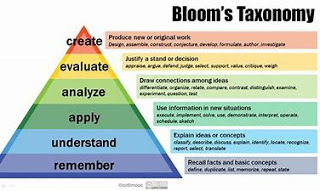 Critical thinking is a highly-valued commodity on Bloom’s Taxonomy of Higher-Order Thinking Skills. As a teacher, I tried desperately to encourage and support analysis and evaluation in my classroom. If a student could defend her interpretation of symbolism, even if I disagreed, I rewarded her inferences. I applied those same skills as a graduate student to infer meaning and symbolism in obscure pieces of literature that were not found in literary criticism. Now, the media, political groups, cultural groups and politicians are telling me that I am not free to infer symbolism on my own (for certain things), but I know that when that freedom is breached, there will be no end to the power to control thoughts and freedoms. Those entities prefer that others operate at the bottom of Bloom’s Taxonomy for Higher-Order Thinking Skills. Their demand is for the masses to simply “remember” and “understand,” to simply regurgitate what they wish the public to think.Those of us who prefer to operate at the top of the taxonomy, analyzing, evaluating and creating on our own are cognizant of rights and freedoms and intellects being subtly assaulted. I have not named specific instances of these assaults because I trust you, my intelligent readers, to apply what I have discussed in this post, not only to literature, but to religious, cultural, political and social institutions. I trust you to extrapolate and infer on your own. For me, as a writer, I create new, original works all the time—some contain religious symbolism that some publishers fear and some readers abhor because my novels are based on Christian concepts. Nevertheless, I write what God places in my heart. I have recently written a pro-life novel that is heavily laden with veiled Christian symbolism. Though I face censorship of thought and creation in the publication process, I will not capitulate. In fact, the censorship has done the opposite. It has fueled my full and unbridled pursuit of intellectual freedoms.Think, people, think! That is all.
Critical thinking is a highly-valued commodity on Bloom’s Taxonomy of Higher-Order Thinking Skills. As a teacher, I tried desperately to encourage and support analysis and evaluation in my classroom. If a student could defend her interpretation of symbolism, even if I disagreed, I rewarded her inferences. I applied those same skills as a graduate student to infer meaning and symbolism in obscure pieces of literature that were not found in literary criticism. Now, the media, political groups, cultural groups and politicians are telling me that I am not free to infer symbolism on my own (for certain things), but I know that when that freedom is breached, there will be no end to the power to control thoughts and freedoms. Those entities prefer that others operate at the bottom of Bloom’s Taxonomy for Higher-Order Thinking Skills. Their demand is for the masses to simply “remember” and “understand,” to simply regurgitate what they wish the public to think.Those of us who prefer to operate at the top of the taxonomy, analyzing, evaluating and creating on our own are cognizant of rights and freedoms and intellects being subtly assaulted. I have not named specific instances of these assaults because I trust you, my intelligent readers, to apply what I have discussed in this post, not only to literature, but to religious, cultural, political and social institutions. I trust you to extrapolate and infer on your own. For me, as a writer, I create new, original works all the time—some contain religious symbolism that some publishers fear and some readers abhor because my novels are based on Christian concepts. Nevertheless, I write what God places in my heart. I have recently written a pro-life novel that is heavily laden with veiled Christian symbolism. Though I face censorship of thought and creation in the publication process, I will not capitulate. In fact, the censorship has done the opposite. It has fueled my full and unbridled pursuit of intellectual freedoms.Think, people, think! That is all.February 18, 2020
Eyes in the Back of My Head
 If you ask twenty different authors about from where his greatest strength as a writer comes, you may get twenty different answers. And most, if not all answers, would probably come from a place that you’d least expect.
If you ask twenty different authors about from where his greatest strength as a writer comes, you may get twenty different answers. And most, if not all answers, would probably come from a place that you’d least expect.I can, for example, tell you that you may be surprised to learn mine. At first, if you looked at my curriculum vitae, you might guess that my gift may have come from my education. I have a bachelor’s degree in English and a master’s degree in English education. I even have a year’s work on a PhD. During my courses of study, I took many classes in literature, writing, poetry, linguistics, and the list goes on from there. I did learn many useful things in those classes that continue to help me write today, but you’d be incorrect to believe that my education was my greatest strength.
My training as a writer continued when I sought out writing organizations and groups. I spent many years going to conferences, seminars and workshops, and I bought and poured over many books on the craft of writing. I met a number of award-winning authors and became friends with some. Their rises to the New York TimesBestsellers Lists and the USA TodayBestsellers Lists were impressive, and they shared their tips and secrets about their climbs with me. I sat in a number of critique groups with them and learned from them…but even all that would not be where my greatest strength as a writer lies.
Well, you might question, did it come from my employment as a managing editor at a publishing house? Even though I poured over many hundreds of manuscripts and ushered many through the publication process—from submission, to acquisition, through a three-pass editing process, to copy-editing, to proofreading, through creating back cover blurbs and managing the cover process and ultimately the book’s publication and marketing—you would be wrong if you guessed that my position as managing editor informed my writing the most.
Ah, you say, is it that my strength comes from my love of literature and, therefore, my love of reading? Nope. Though I love literature—especially Southern literature—and I can be a voracious reader at times—that is not from where my greatest strength comes. Maybe you would go back a little further to when my grandfather ignited my love of story when he told me countless tales on his front porch as a little girl…or maybe it began when I started writing poetry and stories when I was in elementary school because of my grandfather’s tales. Nope and nope.
My greatest strength comes from my having been a teacher. I not only learned how to captivate an audience, but I learned how to effectively convey information through inspiration. It was in that profession that I learned about people, and I applied that knowledge to writing characters.
You see, when you are a teacher, you develop eyes in the back of your head. I didn’t understand this concept at first. When I was student teaching, I didn’t have that talent. But I recognized it the first time I saw it in a colleague when I was paired with him to do “Lunch Duty.” Ken Boleman was a consummate professional. We stood together for a week in the outdoors of Summerville Intermediate High School at our station. As we talked, and he showed me the ropes, he interrupted our conversations again and again by strolling over to different groups of students. I was confused each time he left, but he had seen something that I had not. He would come back with confiscated cigarettes or other contraband. He stopped multiple instances of PDA (and more). I was amazed at his intuitive assessment of each situation—situations about which I was ignorant. I realized then that he had those mysterious “eyes in the back of his head.” He had honed his ability to read situations, behaviors and people. I wanted that skill!
It took a couple of years, but eventually I grew the same eyes in the back of my head. After watching thousands upon thousands of students try the same types of tricks, teachers learn the subtleties of behaviors. I learned to watch for the “watching of the teacher” and then the averted eyes. I learned about both sincere excuses and apologies…and the insincere ones. I learned character…and character traits. I watched as students wanted to learn from me…and I watched those who tried to play me.
I saw the characteristics in students that propelled them to go on to be doctors and lawyers and ministers and teachers, and I saw the characteristics in some students that turned them into murders, rapists, thieves and pedophiles.
Throughout my years, as I was developing my eyes in the back of my head, I still stayed positive, looking for goodness. I always hoped for the best in each student and gave each a chance. Though we weren’t allowed to openly express our religious beliefs to our students, I always lived my Christian beliefs in front of them, extending the hand of kindness and understanding, even through their issues. Many of my greatest rewards were with those students.
Being a teacher taught me how to understand one of the most important trinity concepts in writing—goal, motivation and conflict. I saw how these concepts were worked out in my students’ lives. I learned to read subtle signs of need, greatness, disrespect, compassion and corruption… I learned…people, and I responded with empathy.
From those years as a teacher that I spent understanding people, I understood what goes into characterization. I learned to write the subtleties of three-dimensional characters—their needs, their issues and how those things manifested themselves in characters’ daily lives, and how to resolve those conflicts on the page.
So, ultimately, though you may not have guessed at first, my greatest strength as a writer comes from my teaching experiences, where I grew the eyes in the back of my head.
February 7, 2020
Shakespeare Is Southern!
 I’d like to nominate William Shakespeare as an honorary Southerner. He is already unquestionably one of the most quoted, prolific poets and playwrights of all time. Unfortunately, many people think him inaccessible; however, I differ. In fact, his universality is at the very core of his popularity. He grasps the myriad personalities that create social strata across cultural divides. His abilities to create real characters and expose internal conflict is particularly exciting, and if his dialect were delivered with a Southern drawl, the world would say that he belongs to the South!
I’d like to nominate William Shakespeare as an honorary Southerner. He is already unquestionably one of the most quoted, prolific poets and playwrights of all time. Unfortunately, many people think him inaccessible; however, I differ. In fact, his universality is at the very core of his popularity. He grasps the myriad personalities that create social strata across cultural divides. His abilities to create real characters and expose internal conflict is particularly exciting, and if his dialect were delivered with a Southern drawl, the world would say that he belongs to the South!Will has created words and phrases that have gone mainstream in the Southern dialect. He gave us, “Neither here nor there" for us to dismiss extraneous comments. He gave us “Salad days” to help us remember our youthful, more inexperienced times. He gave us “Send him packing” to colorfully show how we get rid of carpetbaggers and other useless people.
Will told us that “Mum’s the word” so that we can pretend we don’t gossip about our neighbors, and he taught us how to live “With bated breath” when we anxiously wait for Northerner neighbors to understand our Southern way of life, which may never come.
Particularly in the South, I have seen the “Green-eyed monster” rear its ugly head when one family thinks its heritage is grander than another’s. I have seen people’s hopes “Vanish into thin air” as their dreams don’t materialize. And in almost every tale told in the South, I have heard said tale turn with the phrase “All of a sudden.”
Personally, I have been on a “Wild goose chase,” trying to find a decent man to date, and I’ve been “Eaten out of house and home” by hungry party guests. I’ve been “Up in arms” over people who do not know how to appreciate my Southern hospitality, and I’ve have seen “The devil incarnate” in the form of fake friends. I’ve been told that someone has “A heart of gold” at my church, and I’ve been told that “All that glitters is not gold” by my mother. I’ve also been told that many times something that I would like to affect a change has already been declared a “Forgone conclusion.”
I could go on and on, but you’d eventually tell me “Good riddance,” so I’ll move on so I don’t get myself in “A pickle.”
William’s plays and poems hit at the very heart of the human condition, and that fact is the very detail that makes Will so Southern. Romeo and Juliet features families that feud over social status (such a Southern theme). Julius Ceasar shows how even the common man cannot handle power, and how war is always at hand. Hamlet teaches us how crazy and underhanded even honorable families can become. Macbeth is the epitome of envy and social climbing. Hello, these themes (and more) are at the core of Southern society.
Southerners have adopted so much of what William Shakespeare wrote in the 1600’s, even though all may not even understand from where it came. Though you may say “It’s Greek to me,” I will continue to advance the theory that Shakespeare is essentially Southern all the “livelong day.”
*All phrases in quotations are from the bard!
February 3, 2020
Authentic Southern Writers
 What does it mean to write Southern? Well, it’s not about writing in a location. You may not even be a Southern writer if you were born in the South, though being born and raised in the South will give you a huge advantage.
What does it mean to write Southern? Well, it’s not about writing in a location. You may not even be a Southern writer if you were born in the South, though being born and raised in the South will give you a huge advantage. As a student and connoisseur of Southern literature, being brought up on Flannery O'Conner, Truman Capote, Eudora Welty and Mark Twain, I have learned to distinguish between the nuances of true Southern writers and those who—bless their hearts—wish to be. The differences are sometimes subtle but stand out like a carpetbagger at a pig pickin' to natives.
I do appreciate those who love the South and have tried to assimilate into our culture so that they've taken it upon themselves to document our truth with words in novels and poetry. It's just that many who genuinely know and love Southern literature are authentic Southerners themselves, and when they read those authors who straddle the Mason-Dixon Line with words and details—well, let's just say, they can tell (and it pulls them out of a story).
Southerners use particular dialects, colorful phrases and unusual sentence structures that are unique to an area…and a culture. I could be writing about a party with lots of characters and have numerous Southern dialects, phraseologies and structures in one scene. Writers who don’t understand the South won’t be able to differentiate the linguistic nuances well enough to fool Southern readers; however, they do a good enough job so that they get by with the masses—and the New York editors who’ve never once been to an oyster roast or a camp meeting.
Southerners, however, can identify an imposter from the first page…and from the very first paragraph, they can identify a native who writes humidity and hospitality into every sentence. Normal Southerners don’t prepare meals, they “fix” them. Their meals must be more than the ubiquitous fried chicken, but it won’t include a barbecue with hamburgers and hotdogs. Southern women are affiliated with church and life-long girlfriends, and Southern men know hunting and college football. Though an outsider can toss a few of these facts into a manuscript, a Southern writer can weave these facts into the fabric of the novel effectively and effortlessly.
For many years, my reading list was filled with novels from authentic Southern authors—writers who lived the South, breathed the pluff mud, and ate its fare. Pat Conroy, Ann Rivers Siddons and Dorothea Benton Frank were my favorites and never disappointed on any page. They sat me down and told tales like I’d been told by my grandparents—tales filled with family, heart, disappointment and food. Each had a lesson—a lesson best learned in the South. These days, my heart beats more sadly because each of my favorite Southern writers have ended their stories—two in the last year…and the world of Southern literature is poorer for the losses.
I strive to write that which is authentic, true and realistic for the actual South in which I live—not the one outsiders see or wish it to be. As I weave a tale with an insider’s heart, I attempt to anchor the region as a character in my books. This stretch of Southern coast we call The Lowcountry is my South, my home, my world, and I write about it as though I have been anointed to write a book for a Southern Bible.
September 25, 2019
Reflections of a Pensive Poet
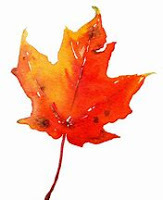 Every year when my thoughts turn to fall, I recall a favorite poem I wrote in the early '90s when I was a graduate student at The Citadel, examining voice in an advanced poetry class.
Every year when my thoughts turn to fall, I recall a favorite poem I wrote in the early '90s when I was a graduate student at The Citadel, examining voice in an advanced poetry class. Reflections of a Pensive Poet
By Vicki Wilkerson
Had my mother not fallen on society’s stage, acting in Someone’s play,
Designed to inspire fantastic and frightening images and phrases in an infant son,
And had my father not found refuge and freedom in escape,
Would I have heard and written the word “nevermore,”
Now forevermore chained and stored in the catacombs of men’s minds?
Had I received the grace-granted love given to all children,
And had I not begged a false father for his despondent attentions—
Attentions that he could not even give his wife, my make-shift mother—
Would others have read how my pen and heart bled
For cold maids and un-dead maidens
Whose love was as temporary and temperate?
Could I have ever told of the tens of thousands of tortures which tormented me
When I could not feed my devoted aunt-mother and dying cousin-wife?
What unnamed fiends found my mind and made a home
Where cold and solitude were my only companions?
My mind was ravened, black and stark,
Scattered with words ushered there by Deprivation and Devastation.
I wonder had I been prosperity’s son,
Would I have heard the haunting, dark verses
Which left my fissured mind weak and unstable, Or would I have heard some chirp-word from some blue bird, Never to be heard from or remembered again?
I can’t remember now if the alcohol was my favored, fancied friend,
Or if it was a necessary nurse to help mend my menaced memories.
My heart told me unspeakable tales others’ hearts could not bear to hear.
My pen pictured devils and Death, Pits and predicaments, Bugs and bitter birds.
It chronicled Mysteries and Masques, Murders and Morgues and beasts and burials.
Was my grief worth the token gold?
Was my piece of fame worth my loss of peace?
Did I as a child belong to the black bird before I ever heard the words
Pick and peck at my head until the vowels were vented
And the consonants were consecrated onto the page?

February 22, 2019
Modesty in the South
As an author of Southern literature, I have taken upon myself to adhere to Southern social and cultural norms that prevail below the Mason-Dixon Line in my writing. I both imply and state blatantly those Southern realities in my novels, and, oftentimes, I enlarge upon those topics in blog posts, magazine articles and newspaper articles. I was born in the South, raised by Southern grandmothers, Southern aunts and great aunts, a Southern mother, and, of course, the revered Southern church ladies, and I received a proper education in modesty—church modesty, societal modesty and even family modesty. From early in my career as an educator, I was asked to officiate propriety at formal school events, like graduation, baccalaureate services, and many times, I was asked by my students to teach them about manners and propriety—the latter of which I declined for obvious reasons.
So, no matter the changing social values and mores in the rest of the country, true Southerners still value modesty. But what exactly is modesty, you ask? Merriam-Webster defines it as “propriety in dress, speech, or conduct.” The Cambridge Dictionary defines it as “correct or socially acceptable behavior and clothes, representing traditional cultural values.” But the definition that I like best—and I can’t believe the English teacher in me is even mentioning this site (because years ago it was not revered)—Wikipedia defines it as “a mode of dress and deportment which intends to avoid the encouraging of sexual attraction in others.”
 Kate Middleton proves that modest dressing is still stylish dressing.
Kate Middleton proves that modest dressing is still stylish dressing.
In a world inundated with Kardashians and Hollywood “It” girls and where showing your body has become more acceptable, the old guard in the South still holds court on promiscuous behaviors and dress. Where the West Coast wears body bearing, low-cut dresses and high-cut shorts, the real South values demureness and pearls. We admire Kate Middleton, Emma Watson, Audrey Hepburn and Barbara Bush, to name a few. You must remember that the South was predominantly settled by the British, and we still adhere to a very formal program of behaviors, if truth be told.
From the time I was young, however, I could point to examples—even in the South—where people where immodest, but those were the people who always walked on the fringes of proper society. They were looked down upon, talked about, and were eventually—in effect—exiled from social engagements, parties and ultimately lost friendships because of their immodest dressing or deportment.
My examples are far and wide, and I could write a novel on the subject; however, a couple of personal examples stand out for me. When I was in college, a friend and I went to a party at a beach house on Folly Beach. Surely, practically any attire would suffice there, right? I was quickly informed by my friend when we arrived in our bathing suits and modest cover-ups that we needed to retire to restroom to “Southernize” out bathing attire with Band-Aids. What? “Yes,” she said. Her respectable Southern mother informed her that we needed to add Band-Aids under our already padded bathing suits to ensure that nothing pointed could be seen or inferred by the other people at the beach house. It was a subtle difference, but one that needed to be defined: What was acceptable ON the beach was NOT the same as what was acceptable IN the beach house around the ladies, their boyfriends and husbands. That lesson has served me well for MANY years after that day. What I may wear in my own yard, house and on my own boat, and around my own husband, I do NOT wear around others that may take my dress as immoderate.
Another early example came from my mother and her friends and dealt with one of my own dear friends who was breastfeeding at the time. Bless her heart, she was not from the South, didn’t have a Southern mother and didn’t know the rules, so, unfortunately, she thought it was acceptable to breastfeed in front of my father, brothers and other men who just happened to be around. Turns out it was not. My mother, her friends and others derided my poor friend and let me know in no uncertain terms that my friend was NEVER to be invited to any other social engagements. Though it was a shame, no one—including me—because it was ungracious to call her out—spoke to my friend about the way Southerners felt about modesty—especially in their own homes. Instead, she found herself OUT of their society.
Right or not, fair or unfair, sexist or not, I am simply blogging about what is, and it IS because we live in the Bible Belt, where myriad examples of the virtues of modesty are given in verse after verse. The lines of modesty in the South may look blurred—at times—especially to outsiders because of our mobile society and because people move below the Mason-Dixon Line and continue to behave the way they were taught in other regions. But make no mistake about it, modesty still prevails in the South, whether or not you understand or not, or choose to ignore it and be eventually, effectively ostracized. In the REAL South, people may as well call it the Modesty-Dixon line.
June 19, 2018
Southern Churches
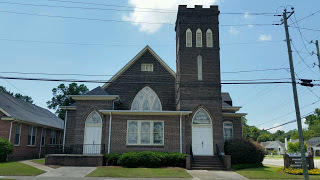 Summerton United Methodist ChurchDon’t you just LOVE Southern Churches? I’m not talking about the monster mega-churches you might find in larger cities. I’m talking about small town churches—you know, the ones that have been there forever and are filled with families who have been attending the same church for generations. These unique places are not only houses of worship—which is their primary and most important function—they are also places that are the social, moral and charitable centers of many areas, villages and towns all over the South.
Summerton United Methodist ChurchDon’t you just LOVE Southern Churches? I’m not talking about the monster mega-churches you might find in larger cities. I’m talking about small town churches—you know, the ones that have been there forever and are filled with families who have been attending the same church for generations. These unique places are not only houses of worship—which is their primary and most important function—they are also places that are the social, moral and charitable centers of many areas, villages and towns all over the South.
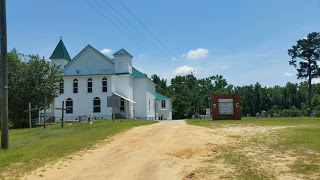 Taw Caw Missionary Baptist ChurchNathaniel Hawthorn wrote in The Scarlet Letter, “The founders of a new colony, whatever Utopia of human virtue and happiness they might originally project, have invariably recognized that among their earliest practical necessities to allot a portion of the virgin soil as a cemetery, and another portion as the site of a prison.” Around these necessary cemeteries, churches were usually built. In later years, churches moved away from that practice; however, small Southern churches remain essential centers of small Southern towns.
Taw Caw Missionary Baptist ChurchNathaniel Hawthorn wrote in The Scarlet Letter, “The founders of a new colony, whatever Utopia of human virtue and happiness they might originally project, have invariably recognized that among their earliest practical necessities to allot a portion of the virgin soil as a cemetery, and another portion as the site of a prison.” Around these necessary cemeteries, churches were usually built. In later years, churches moved away from that practice; however, small Southern churches remain essential centers of small Southern towns.
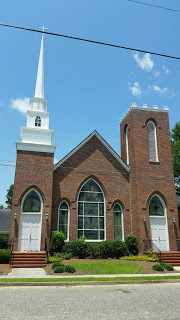 Summerton Presbyterian ChurchI personally love taking photos of picturesque churches as I travel around the South. I am fascinated with the architecture of them. Some are gleaming white clapboards. Some are red brick monoliths. Some have grand columns. Some have bell towers, and others have steeples. Some have elaborate stained glass windows, and some have artless glass through which the sun streams brilliantly. Some churches are simple, and some are grand. Doors can be doubled or single or even configured with multiple sets of accesses, which I often wonder if they were designed to allow for a rush into or out of a particular church. Perhaps the congregation put them there to accommodate for overzealous preachers stepping on too many toes on Sunday mornings.The unique architectures do not end on the outsides of those buildings. Inside, distinctive features can be found, as well. Carved wooden alters, elaborate cornice work, old timber floors, curved pews, grand lecterns and clergy chairs and more decorate the interiors. Some have ornate chandeliers, columns, tapestries, statues, and even balconies. Because churches are centers of worship, many are decorated with the very best a congregation can buy; however, do not dismiss the simplistic beauty of humble places of worship because many of them have an allure with which grandeur cannot compare. Sometimes I’d like to think that God may like them best, but, then, this isn’t a discussion about religion.
Summerton Presbyterian ChurchI personally love taking photos of picturesque churches as I travel around the South. I am fascinated with the architecture of them. Some are gleaming white clapboards. Some are red brick monoliths. Some have grand columns. Some have bell towers, and others have steeples. Some have elaborate stained glass windows, and some have artless glass through which the sun streams brilliantly. Some churches are simple, and some are grand. Doors can be doubled or single or even configured with multiple sets of accesses, which I often wonder if they were designed to allow for a rush into or out of a particular church. Perhaps the congregation put them there to accommodate for overzealous preachers stepping on too many toes on Sunday mornings.The unique architectures do not end on the outsides of those buildings. Inside, distinctive features can be found, as well. Carved wooden alters, elaborate cornice work, old timber floors, curved pews, grand lecterns and clergy chairs and more decorate the interiors. Some have ornate chandeliers, columns, tapestries, statues, and even balconies. Because churches are centers of worship, many are decorated with the very best a congregation can buy; however, do not dismiss the simplistic beauty of humble places of worship because many of them have an allure with which grandeur cannot compare. Sometimes I’d like to think that God may like them best, but, then, this isn’t a discussion about religion.
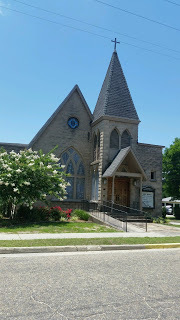 St. Matthais Episcopal ChurchI have particularly fond memories of attending a small, Southern church when I was a child. I loved dressing up in my finery on Sunday mornings with my little patent leather shoes, listening to old hymns echo through a lofty building and being amazed at the way the sun streamed through the textured windows and illuminated all that was around me. The church ladies would comment on my little dresses or bows, and I would run and play with my friends on the grounds after the service had ended. Ah, childhood! But I digress.Summerton, South Carolina, the small town in which I live now, is populated with varied and beautiful churches of all sorts and all denominations. Taw Caw Missionary Baptist church (which is filled with the most INTERESTING history ever), St. Matthias Episcopal Church, Summerton United Methodist Church, Summerton Baptist Church, Liberty Hill AME Church, St. Mary’s Catholic Church, Summerton Presbyterian Church, Andrews Chapel, Calvary Baptist Church, and believe it or not, many others anchor the extremely small town! Churches are a serious business in the South!
St. Matthais Episcopal ChurchI have particularly fond memories of attending a small, Southern church when I was a child. I loved dressing up in my finery on Sunday mornings with my little patent leather shoes, listening to old hymns echo through a lofty building and being amazed at the way the sun streamed through the textured windows and illuminated all that was around me. The church ladies would comment on my little dresses or bows, and I would run and play with my friends on the grounds after the service had ended. Ah, childhood! But I digress.Summerton, South Carolina, the small town in which I live now, is populated with varied and beautiful churches of all sorts and all denominations. Taw Caw Missionary Baptist church (which is filled with the most INTERESTING history ever), St. Matthias Episcopal Church, Summerton United Methodist Church, Summerton Baptist Church, Liberty Hill AME Church, St. Mary’s Catholic Church, Summerton Presbyterian Church, Andrews Chapel, Calvary Baptist Church, and believe it or not, many others anchor the extremely small town! Churches are a serious business in the South!
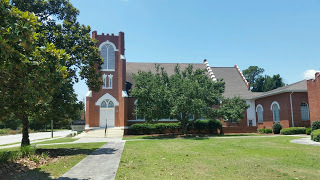 Summerton Baptist ChurchOne can learn a great deal about a town and its people by attending a small town church. Is the congregation formal or informal? Are the people friendly or aloof? Are they focused on local charity or on missions in foreign counties? All are important elements to consider as far as differences go, but there are some similarities in small Southern churches, as well.Southern churches are great places to celebrate all of life’s big events: weddings, baptisms, christenings, Christmases and Easters. They are essential to making connections, personal and professional. They are places where you are taught the morals and mores of local society. Some have schools, and many have daycare centers. They are places where you are held to standards, and if you fall away from those standards, there are always the ubiquitous “church ladies” who will try to keep you straight, if they can. Many times churches are places of love and acceptance, and they will be the place from which you’ll receive meals when you are ill, cards or calls when you go missing, invitations to worship at special events, and visits from the minister at your home or in the hospital when you are leaving this earth.One of the most important social features of Southern churches is the breaking of bread together. Again, I’m not talking about the more reverent “Communion of Saints;” I’m talking about Sunday dinners on special occasions. It is called by many names: homecoming, dinner on the grounds, church suppers, church socials, potluck dinners, fellowship dinners. No matter the name, it involves eating the most delicious food you’ve ever tasted. Why? Because that’s when all the ladies break out their special recipes to show off their cooking skills! And if those ladies have ever gotten together to publish a cookbook, well, you’d better buy one because they are filled with the best recipes in the region!
Summerton Baptist ChurchOne can learn a great deal about a town and its people by attending a small town church. Is the congregation formal or informal? Are the people friendly or aloof? Are they focused on local charity or on missions in foreign counties? All are important elements to consider as far as differences go, but there are some similarities in small Southern churches, as well.Southern churches are great places to celebrate all of life’s big events: weddings, baptisms, christenings, Christmases and Easters. They are essential to making connections, personal and professional. They are places where you are taught the morals and mores of local society. Some have schools, and many have daycare centers. They are places where you are held to standards, and if you fall away from those standards, there are always the ubiquitous “church ladies” who will try to keep you straight, if they can. Many times churches are places of love and acceptance, and they will be the place from which you’ll receive meals when you are ill, cards or calls when you go missing, invitations to worship at special events, and visits from the minister at your home or in the hospital when you are leaving this earth.One of the most important social features of Southern churches is the breaking of bread together. Again, I’m not talking about the more reverent “Communion of Saints;” I’m talking about Sunday dinners on special occasions. It is called by many names: homecoming, dinner on the grounds, church suppers, church socials, potluck dinners, fellowship dinners. No matter the name, it involves eating the most delicious food you’ve ever tasted. Why? Because that’s when all the ladies break out their special recipes to show off their cooking skills! And if those ladies have ever gotten together to publish a cookbook, well, you’d better buy one because they are filled with the best recipes in the region!
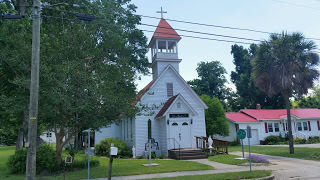 St. Mary's Catholic ChurchI could go on forever—especially about the food—but that would be tedious to readers. In summation, many good things come from Southern churches. They are places to connect, to understand the culture and town, to admire beauty inside and outside the buildings, to learn and to teach, to give and to receive, but no matter the reasons that bring you to the buildings, they are first and foremost places to worship as you choose, if you choose.
St. Mary's Catholic ChurchI could go on forever—especially about the food—but that would be tedious to readers. In summation, many good things come from Southern churches. They are places to connect, to understand the culture and town, to admire beauty inside and outside the buildings, to learn and to teach, to give and to receive, but no matter the reasons that bring you to the buildings, they are first and foremost places to worship as you choose, if you choose.
May 26, 2018
Stalked!
 Have you ever been stalked? If you have, you know how scary it can be. If you think you haven’t, you may not even know that you have been stalked. Authors love to write about stalking because it adds tension in books, the same as in victims’ lives. People call it stalking because it is what animals do—they quietly, secretly, stealthily creep around looking
for
its target,
at
its target, salivating for
contact
with the target, and the victims (frequently) don’t even know it—until it’s too late! That is why you must be aware of stalkers at all times. Unfortunately, in a way, the victim must be constantly cognizant of her stalker to keep herself safe and informed about what the stalker is up to, planning, thinking, saying, doing. Because there are signs of trouble beforehand, and you must be aware in order to protect yourself.
Have you ever been stalked? If you have, you know how scary it can be. If you think you haven’t, you may not even know that you have been stalked. Authors love to write about stalking because it adds tension in books, the same as in victims’ lives. People call it stalking because it is what animals do—they quietly, secretly, stealthily creep around looking
for
its target,
at
its target, salivating for
contact
with the target, and the victims (frequently) don’t even know it—until it’s too late! That is why you must be aware of stalkers at all times. Unfortunately, in a way, the victim must be constantly cognizant of her stalker to keep herself safe and informed about what the stalker is up to, planning, thinking, saying, doing. Because there are signs of trouble beforehand, and you must be aware in order to protect yourself.Unfortunately, I have some experience with this topic. I’ve been stalked by two serial stalkers, upon whom I’ve had to call the police, by two men from previous relationships who didn’t want to let me go, and by a woman (who was married to a different man) who had an agenda to undermine my relationship with her ex-husband from whom she’d been divorced for over ten years. The first two were scary threats, and the last three were simply up to no good. But make no mistake about it, the latter category could always turn South, and that is the reason they should be monitored, too.
I didn’t understand stalking at first because I was a polite Southerner. Why on Earth would one want to be in the company of someone who didn’t want to be with them? Relationships are a two-way street, right? People tell you and give off vibes to let you know they don’t want your company. Stalkers—on the other hand—are socially handicapped and do not “get” those vibes, hints, or words. In fact, you can vehemently tell them to stay away from you, and they won’t because of one universal characteristic: Stalkers do not hear the word “NO”!
In fact, stalkers do not even recognize that they are stalkers. They have NO boundaries. The police can come. You can take out a restraining order. You can say anything to them to show your discomfort or fear of their behaviors, and it doesn’t matter. They are solely focused upon their agendas, unable to admit to themselves that they are, in fact, a stalker. Instead, they say they are around you to help you, to love you, to warn you about dangers, to simply talk to you, to spend time with you. Who wouldn't want that, right? Wrong! They don’t recognize that you didn’t invite them to the movies—and they show up at the movies when you are there (WTFun?). They don’t care that you don’t go to their house to visit them—and they come to your house almost daily. They don’t care that you didn’t invite them to go shopping with you—and they show up at the mall or the grocery store or a restaurant (coincidentally) when you are there. And they ALWAYS have an excuse for their contacts with you and their behaviors toward you.
I also learned firsthand that the police can do little unless the stalker has threatened you. Unfortunately, stalkers are very good at what they do, and with a little information, like where you work, they can make your life a constant anxiety fest. After the initial daily stalking from a man we’ll call…I don’t know, say “Dan”, I would go for relatively long periods of time (a year or more) without ever seeing “Dan.” Then he’d show up in the mall and follow me around while the security guard yelled at him to leave me alone, and then “Dan” disappeared when I heard the police sirens finally arrive. I wouldn’t see him for another year, and then I caught him watching me with steely eyes from across the ice rink at a hockey game. Then I wouldn’t see him again for another year, until he saw in the paper that I was orchestrating the commencement exercises at the high school where I taught. By then, I’d hoped “Dan” was in my rearview mirror, but no. He spotted me at the North Charleston Coliseum at the graduation ceremony, and tried to get to me to through the crowd to “talk.” I had to fight the crowd to get to a security guard who whisked me away under the bowels of the coliseum and out a secret exit and to my car. Though that was now twenty years ago, he recently ran into my sister-in-law, and told her he was still in love with me. I still cannot let my guard down when I am in public.
In the spirit of the Me, Too Movement, where the perpetrator cannot explain away the unwanted, unencouraged sexual behavior, the stalker does NOT get to decide if what they are doing is stalking! Stalking is called by the victim, just like sexual harassment is called by the victim. If any person is showing up in another’s life and it makes the victim feel uncomfortable, she is empowered to call it what it is—stalking!
I said all that to say this: You can never truly let your guard down with a stalker. Be aware of your surroundings and the stalker’s “understandings” about you and his/her intentions toward you because even if you haven’t heard from the stalker in a while, he/she may still be watching you! My husband is a hunter (and yes, “Dan,” he owns LOTS of guns, in case you’re wondering), so I will use his analogy freely. While you are hunting a deer (going about your daily activities), be aware of the bear that has been following you for miles and you’ve never even heard a twig snap. By all means, in order to stay safe, know what your stalker is up to—in essence, stalk your stalker!

